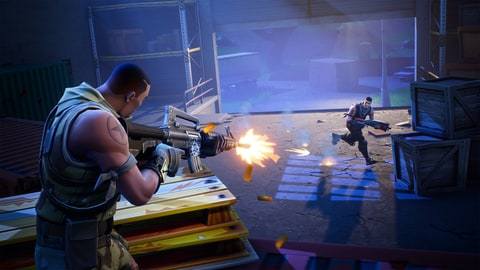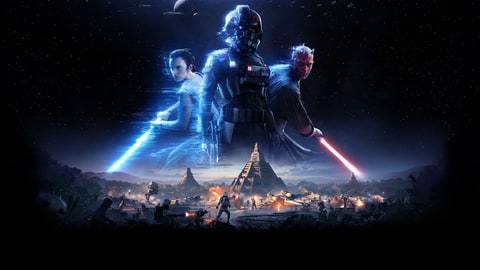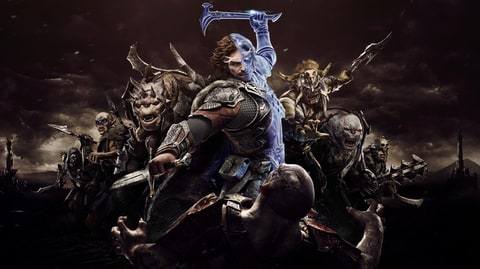Why Microtransaction and Loot Boxes Are Destroying Games
By Trevor Ruben
LOS ANGELES (Variety.com) – Currency has no inherent value. It’s the things we can get with that currency that matter, that put meaning into the paper in your hand, the silver in your game or that little gem counter on the top of your mobile device’s screen.
What’s insidious about currency, digital or not, is the distance it creates between person and product where we are asked to conjure up value. Within that middle ground, we can be manipulated, blinded, and marketed to in as many ways as one can imagine. Nowhere else is that made more obvious than when a video game asks you to buy fake money with real money before allowing you to buy the actual thing you want. This is where the consumer is unceremoniously stripped of the only power he or she has in a marketplace: to place total value on the game itself. The power of a single purchase tells the game makers the simplest of things: I like this game better than the other. But shifting away from a single purchase to the damning temptation of tiny in-game purchases, for developers and consumers alike, is a destruction of that honest transaction and the inherent trust built into it.
Put plainly: the existence of microtransactions, and the fake money that works to hide their true cost, don’t hurt just one game, or one genre. Microtransactions hurt the entire industry by bending to breakage the one thing that every market needs: honest, comparative judgment between products.
Take the comparisons between the massively successful PlayerUnknown’s Battlegrounds (PUBG) and the AAA studio-backed Fortnite Battle Royale. While the discussion brings with it any number of game design questions, a specter of microtransactions also float over both. The Battle Royale mode in Fortnite is structured almost identically to PUBG, Epic Games has challenged the aged debate of inspiration versus rip-off, and for the most part has come out on the other side relatively unscathed. People are enjoying the game, and PUBG developer, Bluehole, has offered nothing more than complaints and a seeming ignorance of the nature of free-market competition. All this be damned, though, because it’s the economic angle to their comparison that will undoubtedly create their most essential means of respective survival. Bluehole got PUBG off the ground by selling $30 early access versions of the game, and has upheld the social contract with early buyers to keep building the game as if in full-time development. Until only recently, PUBG did not feature microtransactions and was successful regardless.
Fortnite, on the other hand, took a hard 180 from a problematic, microtransaction-infused initial launch, and released a much more accessible Battle Royale mode as free-to-play with no microtransactions as of yet. Though I suspect they will be implemented as the game sees more success.
These two games are, on the quality of their gameplay alone, in direct competition. But Epic, in a far more comfortable financial position as a massive publisher with many revenue streams, can afford to take a loss on Fortnite with only a suspicion of microtransactions as a future source of revenue. For the player, Fortnite Battle Royale seems the more valuable game. It’s currently free and, for the sake of this argument, it’s the same game as PUBG. What’s been perverted is the player’s ability to create a proper comparison between the two titles, as this new Fortnite may never require PUBG’s premium price.
What the spending of money in any fair market allows the consumer to do is indicate what is valuable and what is not. In the scenario that both of these titles have not even reached the point where microtransactions are an active revenue stream, the potential of their future implementation in the publisher and consumer’s mind alike create an essential unbalance in the comparison of two things that are as close to the same as you can get in the industry. We can’t spend money in a way that actually provides for proper market comparisons. Even in the space of time when each game was available for purchase at a premium price, the publisher’s option to one day transition to microtransactions as a primary revenue stream allows for a valid rationalization of a game’s perceived failure against its competitor. This fluidity of a game’s profitability appears beneficial – early access games like both Fortnite and PUBG maintain flexibility in the market across development and monetization alike – but, like in-game currency, the games’ vague statuses perform a naturally damaging obfuscation of market comparison.
The question then becomes, how are we really comparing the games?
I draw that answer from personal experience: I enjoy the digital collectible card game Plants vs. Zombies: Heroes. As one of the many Hearthstone–inspired, popular franchise spin-offs, and backed by EA, Plants vs. Zombies: Heroes follows the well-worn business model of its looming competitor. It’s free to play, with a healthy start-up dosage of gems and such to get the new player rolling, followed by a very clear slowdown of digital currency output to encourage buy-ins to gem packs and randomized card packs. This mixture of gambling and microtransactions does much for the developer and publisher alike, justifying a genre in the digital format that struggled to survive before the model surfaced. And, as a so-called free-to-play player, meaning I don’t make any real-money purchases and instead opt to grind for my cards, I certainly take advantage of the set-up. I likely would never have played the game had it asked for money upfront, yet now I play it on a near daily basis. I clearly value the time I spend playing it. But how much is this game really worth to me? This question is the basis for the winner and losers in any market, gaming included. And if I ask, how much is Plants vs. Zombies: Heroes worth to me as compared to its primary competitor, , I do the thing that games in competition are supposed to make me do: choose a winner.
If we begin with the premise that real-world money determines each game’s value, then they are both infinitely valuable to the player and cannot be compared, because they are both free. This also implies that the games have no value to the publisher, being free, but of course, that’s not true. So we can’t do that because I still have to make a decision. If I’m offered the premise that the money I spend in-game, as enabled by the extra real-world money I put into it, grants me the opportunity to place a real-world value on the game, then I can begin to decide which game is really worth it at the end of the day. But here we see the first step toward widening the divide between a player’s purchase and the value that purchase portends. You cannot compare the in-game currency of Hearthstone to the in-game currency of Plants vs. Zombies: Heroes, at least not as they change and fluctuate in real time. Even if a gem in one game is equal to the dollar amount of a gem in another, what that gem gets you is undoubtedly, at least slightly, different across the titles. You cannot evaluate the value of one game to the next because they do everything they possibly can to convince you that they are self-contained economies, despite the fact that they are asking for your real-world money, anyway. So I lose the ability to really compare the games’ relative value.
In-game currency really only determines how quickly I can be successful in that game, however success may be defined. Quickly, then, is the keyword. It comes down to time. Instead of just real-world money, or in-game money, we are presented with the premise that our time spent progressing in a given game is its true value, and we must decide whether or not it is a waste of our time to grind in our favored game, or simply buy out that chunk of wasted time and get to the good stuff. A free-to-play game does not sell its in-game currency or items; it doesn’t sell anything, in fact. It holds hostage the one thing that is obviously more valuable than money. They hold hostage your time in this world, and they depend on the cruel insidiousness of competition in a capitalist culture to drive people to climb an endless ladder just to see their fellow man one rung lower. I have the better cards, the prettier character, the better gameplay experience. I made it further. One more dollar, one more quarter, one more cent.
You still lose in the end, because you’ve traded money for time. You haven’t purchased a game. You haven’t incentivized quality through the dissemination of your money, which is the only real power an individual holds in a free market. You have been sold back time in your life to do something, anything, else. All the confusion created by multiple in-game currencies, endlessly adjusted pay scales for items, manufactured fluctuations in a game’s self-contained market, and so on, is an endless loop meant to divide your spending from the game’s true value proposition: time, or, your actual life away from the game. As both the only governing body with a responsibility to the people partaking in these digital markets, and the only salesman within those markets, game publishers are the definition of compromised. In such a dynamic, the first thing that goes is quality. A game no longer has to be good to get your attention. It only needs to offer you more of your own time back to you. The next time a game offers you a deal on a microtransaction, remember that they are selling you nothing. They are returning what’s rightfully yours.
Is this really how you want to enjoy your games?
A strong counterpoint to all of this is that what the free-to-play, microtransaction model does for the industry is allow a low barrier of entry to new ideas, new genres, and young publishers trying to find a way in. And we’ve certainly seen that played out in a variety of instances, emblematized by the emergence of the entire MOBA genre through free-to-play games like the League of Legends and DOTA 2. But perhaps it’s time to pull back a little bit. Perhaps the honeymoon phase of microtransactions, where the good outweighed the bad, is over, and the best of what we can get out of the model is finally giving in to the worst.
The MyCareer mode in NBA 2K18 is made objectively worse and slower by microtransactions. A version of that game released before the advent of microtransactions would have simply included the mode as it would exist for the person who today needs to purchase progression. In other words, microtransactions make games easier for wealthy people and harder for rational people. 2K Games knows this. The NBA 2K18 MyCareer mode review from Kotaku’s Luke Plunkett , in its meticulous outcry at the game’s microtransaction infestation, mentions the fact that “my review copy came loaded with VC [virtual currency]. It would take someone not buying additional VC over 200 games to get to this level.” The best version of this game is the one that 2K Games provided to reviewers, and no one else.
Do you remember Evolve? Whatever that $60 game could have been, the tidal wave of microtransactions on launch day effectively decapitated its future prospects and served up to consumers the brainless remnants picked over by the greed of a publisher. The developer for that title, Turtle Rock Studios, who innovated that type of asymmetrical play with the original Left 4 Dead, gave up on their game after an equally ill-fated attempt to revive it as a free-to-play title. I’m sure publisher 2K Games made a decent launch-day return on investment, though.
Thankfully, what the success of PUBG has proven is that the low barrier to entry offered by the free-to-play, microtransaction model is not necessary to fuel new ideas in the industry. Instead of quantity of options, the slow build of quality across the burgeoning battle royale genre has provided us with fierce competition and some truly great experiences. Only once Epic decided to exploit the free-to-play model did the microtransaction temptation remind us of its influence. Again, our ability as consumers to provide the only feedback that matters to any competitive company, by giving them money, is destroyed by the threat of microtransactions. Even PUBG, despite its massive financial success, recently said it plans to introduce a loot box and key system for in-game cosmetics displaying every telltale sign of microtransaction obfuscation and cognitive dissonance. What stands as a prime example of the premium-price model is, for economic temptation alone, headed down that destructive path.
Somehow, though, when something like microtransactions goes from bad to worse, it’s too easily rewritten in our minds that it went from OK to bad, that there’s a version of it that’s acceptable. There isn’t, at least not anymore.




